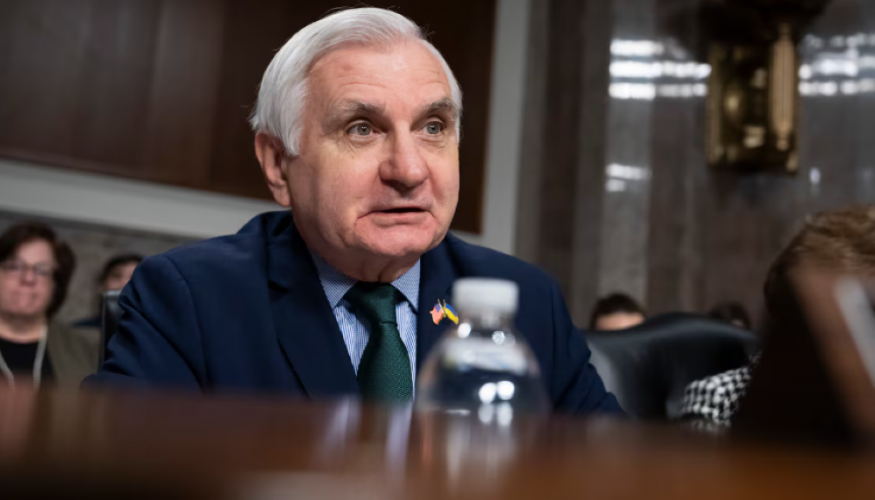Senator Jack Reed critiques Trump policies on tariffs, USAID, NIH cuts, Greenland

By Omar Mohammed, Boston Globe
PROVIDENCE — Senator Jack Reed spoke on Monday at business group New England Council event in the city’s downtown and offered a critique of President Donald Trump’s policies on trade, foreign aid and cuts to scientific research and their impact on America’s role in the world.
Here are some takeaways from Reed’s appearance:
On Trump’s talk of aquiring Greenland
Reed suggested that Trump’s desire to aquire Greeland was an attempt at diverting the focus from economic issues such as elevated inflation.
“I think that this is another one of those absurd positions you never thought he’d take,” he said.
The Senator warned that the Arctic island was part of Denmark, which is a NATO member. Any aggressive actions by the US against it could trigger Article 5 of the treaty that stipulates that an attack against one member country is treated as an attack on the more than 30 countries that are part of it.
“It’s just crazy, you don’t do it that way,” he said, referring to any interest the US may have over the island’s precious metals and minerals. “What happened to old fashioned diplomacy?”
On Senator Chuck Schumer’s future
Reed was asked whether Senate Minority Leader Chuck Schumer was in danger of losing his position after the New York lawmaker supported a Republican spending bill that evaded a government shutdown. Most of his Democratic colleagues in the House and the Senate, including Reed, had opposed the bill.
“No, I don’t think so,” he said.
Schumer has faced pressure to step down since the bill’s passage. Reed said that his colleagues respected Schumer’s dilemma and his unwillingness to allow a shutdown to happen whose consequences could not be predicted.
Still, he said, the Democratic party needed to be more united in their opposition to Trump.
“We need to be much more unified in order to deliver a consistent message and do it effectively,” he said. “So that’s why all this discussion of, well, ‘Get rid of Schumer’ … it doesn’t help us, it helps, frankly, President Trump. We have to come together very quickly.”
On the effect of tarrifs on home building
Since Trump has returned to the White House, he has been clear about his intentions to impose tariffs on Canada, Mexico, and China. He recently threatened to slap a 200 percent surcharge on wine and spirits imports coming from Europe.
Reed suggested that a potential 25 percent tarrif on lumber, which Canada exports to the US, could make construction of new homes expensive and, in turn, harm efforts in New England to build moreaffordable housing.
The Trump administration’s actions could also spark retaliatory tariffs, he said, which would put upward pressure on inflation and make things expensive.
“Tariffs are going to hurt our economy tremendously,” he said.
Reed said that the uncertainty over the on-again, off-again tariff posture of the Trump administration has already been damaging. Stocks have plunged in recent weeks, though on Monday they went up.
“I don’t know what he’s going to do,” he said, referring to the “reciprocal” tariffs the administration has threatened to introduce on April 2. “But the uncertainty is hurting us.”
On dismantling USAID and America’s influence abroad
Secretary of State Marco Rubio said earlier this month that more than 80 percent of programs run by the US Agency for International Development have been eliminated, part of an effort by the administration to significantly pull back the department’s foreign aid work.
The remaining projects will be administered by the State Department, Rubio said.
Reed said on Monday that the dismantling of USAID was “one of the worst foreign policy blunders” undertaken by the new administration.
In Africa, where the US does not have a huge military presence, programs administered by USAID such as the U.S. President’s Emergency Plan for AIDS Relief, which helps countries battle HIV and AIDS, have given the U.S. authority in the region.
“We’re saving people’s lives, maternal health care, vaccinations…And we just left,” he said.
That void, Reed added, will be filled by America’s rivals, such as China and Russia. Terrorist groups may also fill the gap, he added.
“All these things are happening and they’re thoughtless, because pound for pound, the USAID punched above its weight in terms of delivering that kind presence,” he said.
On cutting NIH funding
Reed said that cuts to National Institute of Health to Rhode Island and other New England states would devastate the region’s scientific research future.
“We’ve led the world in research, and now we’re going to cede that probably to the Chinese,” he said. “So we won’t be developing the new products. We won’t develop the products that [help] people.”
Reed suggested that in addition to the economic impact and jobs that will be lost, the cuts would also by such cuts, it was also “dangerous” as undermine the development of scientists in the country. NIH grants help early researchers to fund their work and without it, they could seek their futures elsewhere.
“So you’re just going to turn people away from science [and] that’s going to hurt us tremendously,” he said.